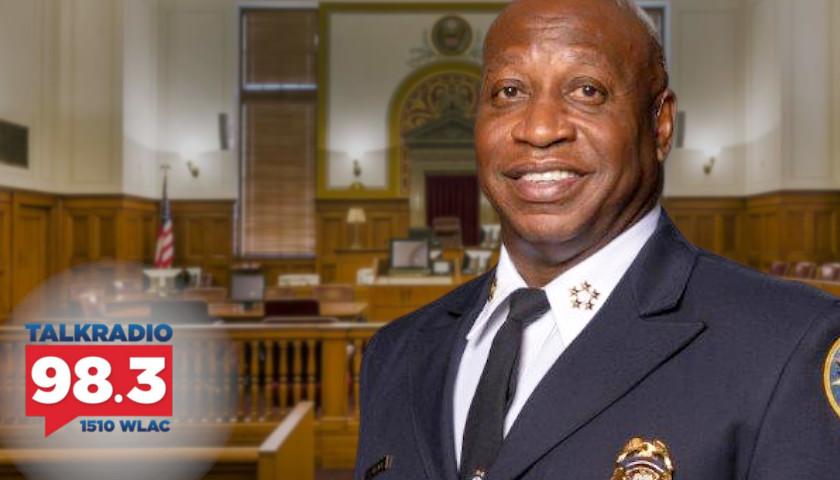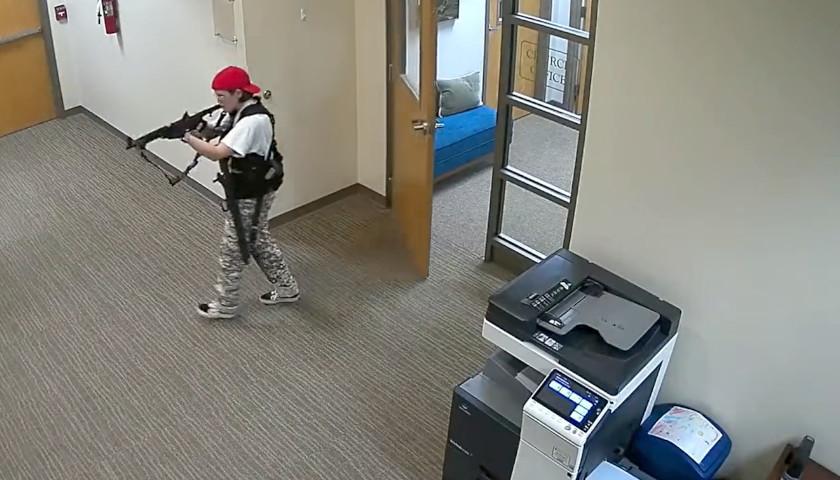Live from Music Row Thursday morning on The Tennessee Star Report with Michael Patrick Leahy – broadcast on Nashville’s Talk Radio 98.3 and 1510 WLAC weekdays from 5:00 a.m. to 8:00 a.m. – host Leahy welcomed attorney Douglas Pierce of King & Ballow to the newsmaker line to discuss the refusal of Metro government to release the Covenant Killer’s manifesto.
Leahy: On our newsmaker line right now, Douglas Pierce, attorney for private investigator Clata Renee Brewer, and for the National Police Association, one of the four plaintiffs in lawsuits seeking the release of the Covenant Killer’s manifesto. Welcome, Doug. Thanks for joining us.
Pierce: I’m happy to be here.
Leahy: Doug, tell our listeners a little bit about your strong record in communications law and First Amendment law.
Pierce: I’ve been with the law firm of King & Ballow since 1984, and we have a history of representing news media clients, radio, tv, and newspapers. And in connection with that work that’s I represent a lot of newsroom operations.
And then also as a result of that, I’ll also represent other parties who want to make use of the very same laws that journalists use, such as the Tennessee Open Records law. And most notably, I have sued both on separate occasions, the Nashville Police Department and the Memphis Police Department concerning their failure to comply with the open records law.
And that’s in the past several years. And the court ruled all the way up to the Court of Appeals in Tennessee that they had willfully and knowingly violated the Public Records Act which entitled my clients to attorney’s fees.
Leahy: So now we have a new case that I think you filed on Friday. Your client Clata Renee Brewer, a private investigator had requested, and the National Police Association had requested Metro National Police Department to comply with the Public Records Act and release the manifesto and related documents. We, of course, also had sent a public records request at The Tennessee Star, Star News Digital Media, Inc. They denied our request. We haven’t sued him. Yet but you have sued them. And tell us how ludicrous their response has been.
Pierce: And not only you and me, but of course, the Tennessee Firearms Association, they filed a request and they also pursued litigation. Plus, there are several other persons, including lawmakers from the General Assembly, who’ve made requests and have been denied.
And up until very recently, within the past day or so, the Nashville police had one and only one excuse for not providing the information, and that was they were relying upon Rule 16 of the Tennessee Rules of Criminal Procedure, which is a very solid exception to the Public Records Act if the facts support it.
But the facts in this case do not support it because the rules of criminal procedure relate to criminal proceedings, and there’s not going to be any criminal proceedings in this case based upon everything that’s been made available to us because, number one, the shooter was killed in the shootout. Everybody acknowledges the police acted very appropriately. And also, there was a lot of indication so far that there was no indication that she had accomplices or co-conspirators.
Leahy: This is like craziness. We heard from Metro Chief of Police John Drake yesterday that on advice from legal counsel at Metro Nashville Legal, they are not going to release anything related to the Covenant Killer manifesto document or anything because you and the Tennessee Firearms Association are suing to get them to follow the law and release the documents. I’ve never heard anything so crazy, have you?
Pierce: You are exactly right. That is their latest excuse, and that is the ultimate catch-22. No one can deny we’ve got a right to file a lawsuit for these records, but now they’re saying yes, you can file your lawsuit, but if you file your lawsuit, that means you don’t get it. You can’t win under that kind of argument.
Simon: What about the idea, Doug, that the police department is taking orders from on high, meaning the FBI, and that they are totally frightened to say anything?
Pierce: There is a lot of discussion, and from my perspective, I’d have to call it speculation. But that could be 100 percent true. Who knows what’s going on there? Ultimately from my perspective, I don’t care about that because the Nashville Police Department they have an independent obligation to comply with the Tennessee law.
They certainly haven’t. So far, they haven’t filed anything in court. And as you’ve pointed out, the police have come out with this latest catch-22 defense. They have not come out with any explanation that we can’t turn it over because the FBI doesn’t want us to. I would think that would also be a very invalid defense to the Public Records Act.
Leahy: Exactly. We have another story that the latest is that the show cause hearing which was originally scheduled in the Tennessee Firearms Association case, was supposed to be held May the 11th, but now won’t happen until June. And now I hear, tell me if this is true, Metro Legal is saying, oh yes, we want to get statements from the victim’s families in this process. What statute in the public records law requires that?
Pierce: I don’t think there is one. And so once again, that is a suggestion and they haven’t come forward with anyone in that category or class of persons, in other words, the family of victims of that shooting yet.
And so it leads you to believe that they are actively soliciting, trying to get some people to come forward and support their claim to avoid turning over the records. I will say this. I guess I just need to leave it there. So far we have not seen anyone else come forward and Metro just wants to hold open that possibility.
Leahy: From a public interest perspective, it seems to me that Metro Legal, and now the Metro Nashville Police Department, are doing everything opposite of what the intent of public records law is. And that is to get these documents out so that the public knows it and they can make decisions. And so people don’t speculate and have rumors.
Simon: Also, public safety.
Leahy: Your thoughts Doug Pierce?
Pierce: I agree with that exactly. And Just to expand upon that a little bit. Number one. Yes, the public records act in this state also specifically says that the act shall be interpreted to give the fullest possible extent of public access. So we’ve got that going for us. And then the speculation concept, it’s only human nature that when you’re denied something to think what are they hiding.
And that was articulated very well by a former chief justice of the U.S. Supreme Court, Warren Berger in a case. He stated that the public does not demand the infallibility of their public institutions, but they find it difficult to accept what they are prohibited from observing. And that’s what we’ve got going on here.
Listen to today’s show highlights, including this interview:
– – –
Tune in weekdays from 5:00 – 8:00 a.m. to The Tennessee Star Report with Michael Patrick Leahy on Talk Radio 98.3 FM WLAC 1510. Listen online at iHeart Radio.





